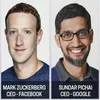[Techie Tuesday] This engineer went from selling men’s face wash to building Facebook’s app monetisation products
In this week’s Techie Tuesday, we feature Kaushik Subramanian, Global Lead, Business PM at Facebook, who built the network's in-app bidding platform that has revolutionised app monetisation for developers.

Kaushik Subramanian, Global Lead - Business PM, Facebook
Kaushik Subramanian left McKinsey to join Facebook in 2018 partly because he always felt “tired and sleep deprived” while at the consulting firm.
Having consulted on M&A projects at the intersection of consumer and tech across countries from the US to Indonesia, Kaushik would find himself “on a flight almost every week”. The burnout of the “high-flying consultant life” was real.
But so were the invaluable lessons he’d picked up at McKinsey.
From understanding how companies take product decisions to helping them ‘merge and acquire’ to hunting for ‘whitespace’ opportunities in the market, he gained quality insights that have come in handy in his current role at Facebook.
Towards the end of 2017, a tech recruiter got in touch with London-based Kaushik. Facebook was filling up core product roles from engineering to UI/UX in the UK.
“It happened at a time when I was starting to feel that I’d learnt whatever McKinsey had to offer,” Kaushik tells YourStory, “Facebook was planning to build global products from London. They approached me, I had a few calls, and joined them in [March] 2018.”

Kaushik, who scaled Audience Network, at the Facebook India Forum
In his role as Global Lead, Business PM at Facebook, Kaushik has been instrumental in building and scaling Audience Network — a platform that helps developers monetise their apps by showing highly targeted ads to users.
He elaborates,
“Facebook has a large third-party ads business that helps app publishers monetise their business by creating personalised experiences for users. The Audience Network product was moving out of California, and I helped build that business in London.”
“I’m learning tonnes about how to grow and scale a tech business while bringing in expertise from my prior life,” he says.
Building and managing products at Facebook
In the last two-and-a-half years, Kaushik has spearheaded the development of Audience Network’s in-app bidding product, and scaled third-party partnerships with leading ad tech players in the ecosystem.
Bidding lets app publishers hold real-time auctions between ad networks and choose the highest bidder to sell their inventory to. This helps them earn a better value per impression and maximise their revenues.
Also, real-time bidding is a far more open and fair process of app monetisation compared to the conventional vertical stacking of ad networks, where developers were offered an average historical price per impression.

Adtech talk at Facebook F8 Developer Conference
Kaushik explains, “Historical pricing is an inefficient way to sell ads because it doesn’t guarantee the future price for inventory. We built a real-time bidding system, which is fair and fast. Whichever network bids the highest gets to deliver the ad to users. Developers also get to boost their monetisation.”
Facebook’s in-app bidding product launched in June 2018, and has effectively changed the way ads are delivered on third-party apps.
“The pure impact of tech in terms of uplifting people is amazing. To know that there are thousands of app developers making money through the products you have built... that is why you go to work every day,” Kaushik states.
Company data reveals that number of apps using bidding has increased 7X, and over one billion users see an Audience Network ad per month.

At the World Economic Forum in Davos in 2016
Besides bidding, Kaushik also oversees a team of product managers who build a suite of offerings within Facebook Audience Network.
One of them is the Monetisation Manager tool, which helps publishers manage their ad placements, track ad performance, and maximise revenues through a single window.
From ideating to testing for product-market fits to developing product roadmaps and GTM strategies, the 30-something Indian techie has done it all. In fact, in his past avatar, Kaushik has even sold men’s grooming products in smalltown India (more on that later).
His journey from FMCG to consulting to ‘Big Tech’ across Europe and South Asia is nothing short of fascinating.
Early life and education
Born and bred in a middle-class household in Pune, Kaushik’s early years were defined by what he calls, “information scarcity”.
“My dad was a scientist and my mom was an educator. We had no access to career counselling back then. So, life choices were restricted by information scarcity. Even law wasn’t a part of our consideration set,” he says.
With a keen interest in tech, he took up computer engineering at Maharashtra Institute of Technology in Pune. He also taught himself HTML, WordPress, and Yahoo! GeoCities (a popular web hosting service from the 90s).
He shares,
“I was always interested in new technology and taught myself how to build a basic product catalogue. In my final year of college, I did a project on cloud-based SaaS; it was new technology back then.”

MICA days (2015-2016)
Kaushik later went on to pursue a “bridge degree” from MICA in Ahmedabad — a place that pulled him “out of the engineering bubble”. However, he wanted to “do a lot more”.
He says,
“I would read a lot of biographies. After reading The Road Ahead by Bill Gates, I wanted to do something that could get me to the top. I realised that most successful people had an international MBA, and I wanted to get one too.”
To improve his shot at a foreign B-school, the 20-something MICA graduate took up a campus offer and joined L’Oréal India as a summer trainee in 2010.
He was soon packed off to North Bengal and Sikkim for marketing L’Oréal’s men’s grooming brand (Garnier) — an experience that would teach the future manager a thing or two about running a business and “selling products”.

INSEAD graduation in 2016
Product lessons from FMCG
When Kaushik joined L’Oréal, little did he know that selling men’s face wash in Siliguri (a wholesale hub in North Bengal) would come as a culture shock.
He recalls,
“I had to do sales and distribution for Garnier in Darjeeling, Gangtok, and Assam. Locals told me that things here move slowly. There was no digital preparedness, no billing systems…we worked on Excel sheets. Digital for FMCG companies meant opening Facebook pages.”
In the five years that he spent at L’Oréal, Kaushik went from being a trainee to Lead, International Product Manager - Garnier, where he was responsible for product innovation across sub-categories in South Asia.

Garnier Men team in India
He oversaw a product pipeline from concept to launch, steered cross-functional teams to create several new brands, and managed P&L for over a $100-million brand, growing it by triple digits annually. In essence, L’Oréal served as his finishing school for product management.
He says, “It taught me that FMCG was big but without tech. I also learnt how a global consumer company thinks about ecommerce. Do they work with Amazon or do they build their own sales channels?”
To build on his learnings at the “intersection of consumer and digital”, Kaushik went on to earn an MBA from INSEAD (in France) — finally realising his international B-school dreams — in 2016.

Selling men's grooming products in smalltown India taught him a few business lessons
The same year, he joined McKinsey in London to consult for global retail, ecommerce, and payment companies. Two years later, he joined Facebook.
Kaushik says,
“Moving to tech had always been the exit plan after McKinsey. There are many parallels between consumer and tech. The difference is that you can experiment with a product daily, ship immediately, and scale globally...unlike a shampoo, which takes a year to go to market.”
"In tech, with just a few lines of code, you can create value from nothing," he adds.
Future of tech and his career
The Facebook product leader hopes to return to India in a few years to build things that can “democratise opportunity” and drive away information scarcity.
He shares, “The current wave of edtech, for instance, is democratising opportunity. With improved access to education from Shillong to Kota, India’s information scarcity is going away. That is big for me.”
“My long-term vision is to enable real change in India either via a successful business and providing jobs, doing something in education or in the public sector. That’s where the growth is. I don’t think someone sitting in the Valley can solve something in Indore,” he adds.

Kaushik hopes to return to India and enable real change
Every week, Kaushik spends hours talking to people in the startup and VC ecosystem to understand the future of tech. It’s a new trend every year, he says, “Three years ago, it was Big Data, last year it was AI/ML; this year, it is GPT-3.”
With consumer behaviour changing dramatically in the pandemic, Kaushik believes that the future of tech would be about making online interactions more offline-like, where users can talk to text and audio.
“There would be an increased application of AI in our mundane day-to-day tasks,” he says. He also expects AR/VR to go mainstream and change customer service and interaction.
"It doesn’t feel as intuitive yet because there are deployment and infrastructure issues. But there is a lot to be built in the B2B infra space," says the product leader.
Edited by Saheli Sen Gupta


![[Techie Tuesday] This engineer went from selling men’s face wash to building Facebook’s app monetisation products](https://images.yourstory.com/cs/2/dc9aa1302d6c11e9aa979329348d4c3e/TT11-1598873894361.png?mode=crop&crop=faces&ar=2%3A1&format=auto&w=1920&q=75)




